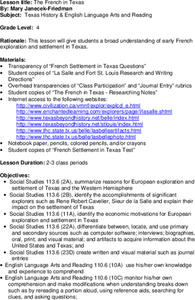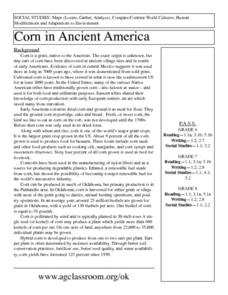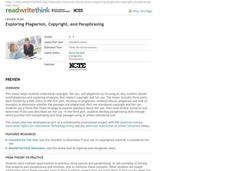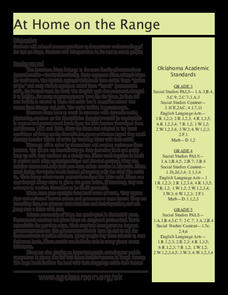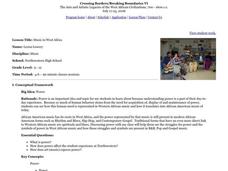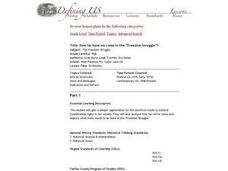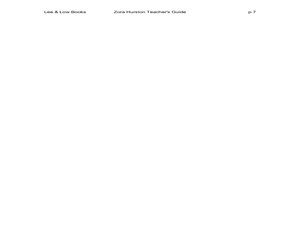Curated OER
Unit 2: Post-Revolution: The Critical Period 1781-1878
The post-Revolutionary Period of 1781-1787, also known as the Critical Period, is the focus of a series of lessons that prompt class members to examine primary source documents that reveal the instability of the period of the...
Alabama Learning Exchange
Exploring Explorers
Students gather information about a 15th to 17th century explorer and prepare a script in talk show format about the individual. Finally, students make a video following the script and present it to the class.
Curated OER
The French in Texas
Fourth graders use Internet to examine early French exploration and settlement in Texas, and write journal entries from point of view of 17th Century French settler, French or Spanish explorer, or Native American whose land was taken.
Curated OER
Corn in Ancient America
Students explore the importance of corn to the survival of early civilizations of the Americas. Through research and discussion activities, they read and describe how corn was used as food and currency in early civilizations. They...
Curated OER
Explorations in American Environmental History
Ninth graders explore the historical perspective of nature and the environment. In this American History lesson, 9th graders examine materials in a variety of formats to understand the contexts of America's concern for the...
Curated OER
America the Bountiful
Fifth graders explore the impact exploration and colonization of North America had on human history. In this American colonies lesson, 5th graders compare differences between colonial areas. Students investigate the global impact of...
Curated OER
Bartering Through the Seasons
Fifth graders explore bartering. In this bartering lesson, 5th graders investigate bartering between the American colonies. Students study the climate and geography of neighboring colonies and investigate crops native to each area.
Curated OER
Deerfield Families
To understand the consequences of the 1704 attack on Deerfield by combined French and Native American forces, groups research primary and secondary resources related to four Deerfield families involved in the attack.
K12 Reader
Conflict Over North American Lands
Readers are introduced to some of the conflicts that arose over land and resources in the Americas in a two-part cross-curricular comprehension worksheet that asks kids to study the article and then to use information provided to...
Curated OER
Colonial Identity
Young scholars research and discuss the origins of the American colonies and explore how colonists were still influenced by English culture. As a follow-up project, students produce a portrait of an individual.
ReadWriteThink
Exploring Plagiarism, Copyright, and Paraphrasing
Plagiarism, copyright, and fair use are the focus of a three-part instructional activity designed to inform scholars of how to properly cite others' work. First, pupils use a KWL chart to begin thinking and...
American Documentary
American Aloha: Hula Beyond Hawai'i
In this lesson, young scholars will examine Hawaii's issues of colonization, authority, authenticity and cultural identity, and understand the distinction between native and non-native Hawaiians. This lesson includes links to videos,...
Walden Woods Project
19th Century Lessons for 21st Century Lives
The words of Henry David Thoreau on Civil Disobedience seem particularly relevant today, as are his writings and those of other transcendental thinkers who ask what it mean to live deliberately and what are the responsibilities of...
Curated OER
Imperialism and Expansion: Part 1
Young scholars explore the era of imperialism and expansion of the United States. In this American history lesson, students play a game regarding the U.S. attempts to expand the nation in the late 1800s and early 1900s.
Curated OER
At Home On The Range
Students explore the history and domestication of the Bovidae family and their importance to our prairie ecosystem. Using a map of the United States, students located the American Great Plains. They complete worksheets and discuss...
Curated OER
Music in West Africa
Students explore power and the symbols of power in West African music. They discuss the music of West Africa and compare it to African American music of today. In addition, they investigate musical instruments of Africa, identify the...
Curated OER
How far have we come in the "Freedom Struggle"?
Eleventh graders assess an appreciation for the sacrifices made to achieve fundamental rights in our society. They analyze how far we've come to explore what more needs to be done in the "Freedom Struggle." Each student completes a...
Curated OER
Voyage to the New World
Young scholars examine the exploration of the New World. They write a descriptive account of the first encounter between Europeans and Native Americans, analyze and label maps, plot Columbus's journey on a map, and write a chapter summary.
Curated OER
Zora Hurston Teacher's Guide
Students explore American culture by reading classic literature in class. In this African-American history instructional activity, students read the story Zora Hurston and the Chinaberry Tree while identifying the work and contributions...
Curated OER
Yerbas y Remdios: A New Look
Students explore human health by participating in a medicine class activity. In this herbs lesson, students identify plants which Native Americans used throughout history to cure illnesses. Students research specific herbs in groups and...
Curated OER
Jamestown
Fifth graders research the Jamestown settlement and examine life in the colonies from 1607-1610. They explore websites, develop a timeline, select two settlers to research, and write three letters written from the point of view of their...
Curated OER
In Remembrance of George Washington
Students explore the contributions of George Washington. In this early American history lesson plan, students analyze the provided eulogy for George Washington written by Henry Lee and then write their eulogies for the first president.
Curated OER
American Indian Art
Fourth graders discover and gain an understanding of American Indian art creating three beads out of clay, showing texture on at least one bead to make a balanced bracelet. They then explain either orally or in writing what kinds of...
Roy Rosenzweig Center for History and New Media
European Explorers
To compare how the Spanish, French, and English approached the exploration of North America, class groups examine primary source documents and become experts on one of four explorers: Francisco Coronado, Robert LaSalle, Samuel de...


